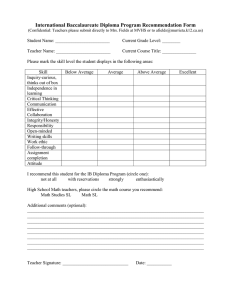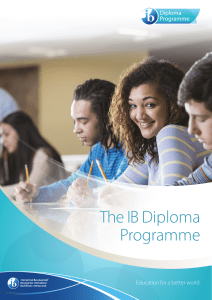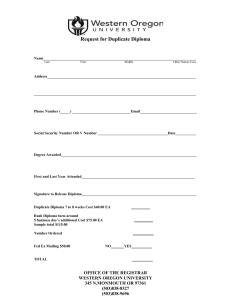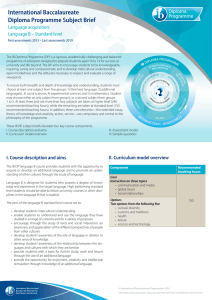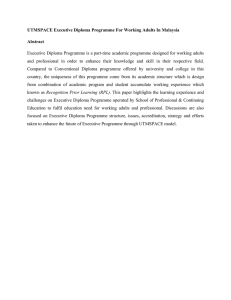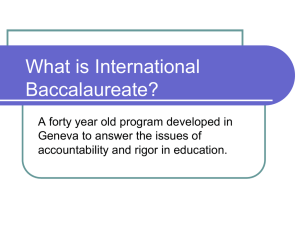The IB Diploma Programme - International Baccalaureate
advertisement
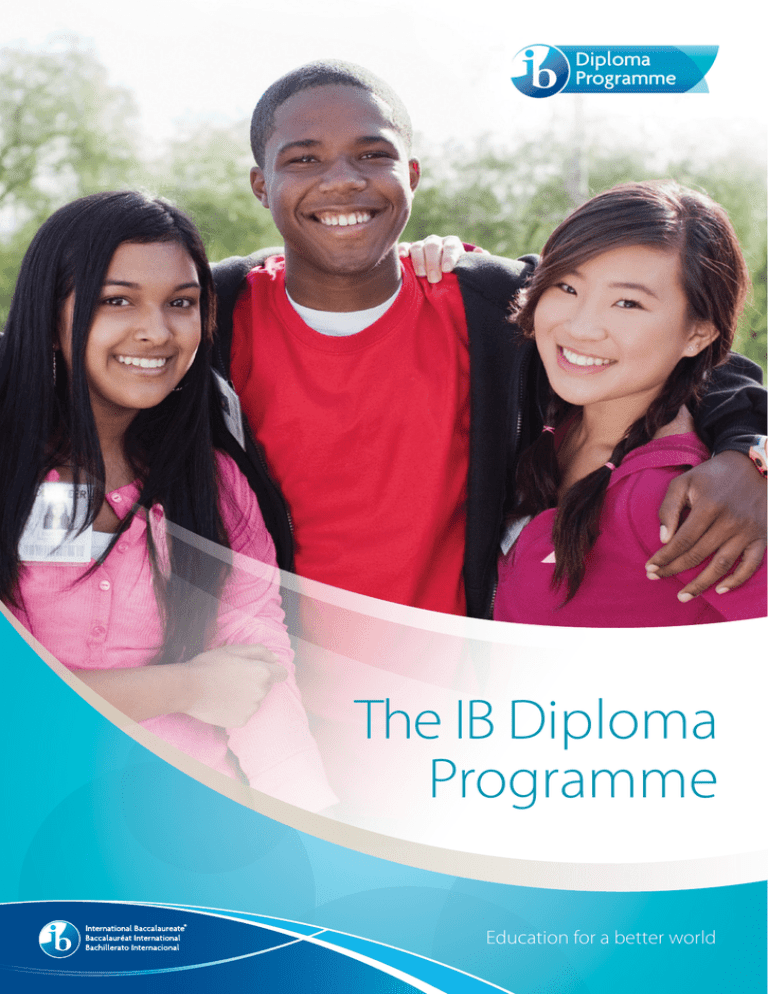
The IB Diploma Programme Education for a better world The Diploma Programme: preparing students for success in higher education and to be active participants in a global society What is an IB education? The IB continuum of international education for 3 to 19 year olds is unique because of its academic and personal rigour. We challenge students to excel in their studies and in their personal growth. We aim to inspire a quest for learning throughout life that is marked by enthusiasm and empathy. The IB aspires to help schools develop well-rounded students with character who respond to challenges with optimism and an open mind, are confident in their own identities, make ethical decisions, join with others in celebrating our common humanity and are prepared to apply what they learn in real-world, complex and unpredictable situations. The IB offers high-quality programmes of international education that share a powerful vision. Informed by the values described in the learner profile, an IB education: •focuses on learners - the IB’s student-centred programmes promote healthy relationships, ethical responsibility and personal challenge • develops effective approaches to teaching and learning - IB programmes help students to develop the attitudes and skills they need for both academic and personal success • works within global contexts - IB programmes increase understanding of languages and cultures, and explore globally significant ideas and issues • explores significant content - IB programmes offer a curriculum that is broad and balanced, conceptual and connected. IB learners strive to become inquirers, knowledgeable, thinkers, communicators, principled, open-minded, caring, risk-takers, balanced, and reflective. These attributes represent a broad range of human capacities and responsibilities that go beyond intellectual development and academic success. What is the IB Diploma Programme (DP)? The IB Diploma Programme (DP) is an academically challenging and balanced programme of education with final examinations that prepares students, aged 16 to 19, for success at university and life beyond. It has been designed to address the intellectual, social, emotional and physical well-being of students. The programme has gained recognition and respect from the world’s leading universities. The Diploma Programme prepares students for effective participation in a rapidly evolving and increasingly global society as they: • develop physically, intellectually, emotionally and ethically •acquire breadth and depth of knowledge and understanding, studying courses from six subject groups •develop the skills and a positive attitude towards learning that will prepare them for higher education •study at least two languages and increase understanding of cultures, including their own •make connections across traditional academic disciplines and explore the nature of knowledge through the programme’s unique theory of knowledge course •undertake in-depth research into an area of interest through the lens of one or more academic disciplines in the extended essay •enhance their personal and interpersonal development through creativity, action and service. The curriculum IB Diploma Programme students must choose one subject from each of the five groups (1 to 5), ensuring breadth of knowledge and understanding in their best language, additional language(s), the social sciences, the experimental sciences and mathematics. Students must also choose either an arts subject from group 6, or a second subject from groups 1 to 5. DP subjects can be taken at higher level or standard level. At least three and not more than four subjects are taken at higher level (240 teaching hours), while the other subjects are taken at standard level (150 teaching hours). Students can study and take examinations, in English, French or Spanish. Two DP subjects are classified as interdisciplinary subjects and so satisfy the requirements of more than one subject group: • Literature and performance - group 1 and group 6 • Environmental systems - group 3 and group 4 In addition to disciplinary and interdisciplinary study, the Diploma Programme features three core elements that broaden students’ educational experience and challenge them to apply their knowledge and skills. The Diploma Programme core • The extended essay asks students to engage in independent research through an in-depth study of a question relating to one of the DP subjects they are studying. The world studies extended essay option allows students to focus on a topic of global significance which they examine through the lens of at least two DP subjects. • Theory of knowledge develops a coherent approach to learning that unifies the academic disciplines. In this course on critical thinking, students inquire into the nature of knowing and deepen their understanding of knowledge as a human construction. • Creativity, action, service (CAS) involves students in a range of activities alongside their academic studies throughout the Diploma Programme. Creativity encourages students to engage in the arts and creative thinking. Action seeks to develop a healthy lifestyle through physical activity. Service with the community offers a vehicle for new learning with academic value. The three strands of CAS enhance students’ personal and interpersonal development through experiential learning and enable journeys of self-discovery. Diploma Programme subject groups Group 1 – Studies in language and literature Language A: literature – 55 languages offered Language A: language and literature – 16 languages offered Literature and performance (also group 6) – 3 languages offered Group 2 – Language acquisition - Design technology - Environmental systems and societies (also group 3) -Physics - Computer science - Sports, exercise and health science (SL only) Group 5 – Mathematics Language B –23 languages offered Language ab initio –12 languages offered Classical languages – 2 languages offered - Mathematical studies SL - Further Mathematics HL - Mathematics SL - Mathematics HL Group 3 – Individuals and societies Group 6 – The arts - Business and management -Economics - Geography -History - Information technology in a global society - Philosophy -Psychology - Social and cultural anthropology - World religions (SL only) - Environmental systems and societies (also group 4) - Music -Theatre - Visual arts -Dance -Film - Literature and performance (also group 1) Group 4 – Sciences - Biology -Chemistry Diploma Programme courses online Students can enrol in a range of authorized DP courses online offered via their IB World School through Pamoja Education Ltd. Assessment Students take written examinations at the end of the programme, which are marked by external IB examiners. Students also complete assessment tasks in the school, which are either initially marked by teachers and then moderated by external moderators or sent directly to external examiners. The marks awarded for each course range from 1 (lowest) to 7 (highest). Students can also be awarded up to three additional points for their combined results on theory of knowledge and the extended essay. The diploma is awarded to students who gain at least 24 points, subject to certain minimum levels of performance across the whole programme and to satisfactory participation in the creativity, action, service requirement. The highest total that a Diploma Programme student can be awarded is 45 points. Assessment is criterion-related, which means student performance is measured against pre-specified assessment criteria based on the aims and objectives of each subject curriculum, rather than the performance of other students taking the same examinations. The range of scores that students have attained remains statistically stable, and universities value the rigour and consistency of Diploma Programme assessment practice. “At King Edward’s School we made the decision to move to a solely IB Diploma curriculum because we believed that it would provide a really challenging education and would be the best preparation for university study”. John Claughton, Chief Master, King Edward’s School, Birmingham UK. Quality assurance and professional development Any school, or group of schools, wishing to offer one or more IB programmes as an IB World School must first be authorized. The requirements are the same for all schools, and the procedure is designed to ensure that schools are well prepared to implement the programme(s) successfully. All IB World Schools are required to participate in an ongoing process of review and development, using the same programme standards and practices. As part of its ongoing commitment to the development of a highly skilled global learning community, the IB provides a wide range of high-quality professional development opportunities to help new, experienced and expert school leaders and educators understand, support, and successfully deliver IB programmes reflecting IB standards and practices. The IB Mission The International Baccalaureate aims to develop inquiring, knowledgeable and caring young people who help to create a better and more peaceful world through intercultural understanding and respect. To this end, the organization works with schools, governments and international organizations to develop challenging programmes of international education and rigorous assessment. These programmes encourage students across the world to become active, compassionate and lifelong learners who understand that other people, with their differences, can also be right. • • • • Become an IB student Teach at an IB World School Become an IB World School Volunteer or work for the IB Support our mission and join the IB community at http://www.ibo.org or contact your IB regional office: IB Africa, Europe and Middle East IB Asia-Pacific IB Americas © International Baccalaureate Organization 2012 The words ‘INTERNATIONAL BACCALAUREATE®’, “‘BACCALAURÉAT INTERNATIONAL®’, ‘BACHILLERATO INTERNACIONAL®’ and ‘IB®’ are registered trademarks of the International Baccalaureate Organization and may not be used as (or as part of ) a product or publication name, company name or registered domain name without the express written permission of the International Baccalaureate Organization. International Baccalaureate® | Baccalauréat International® | Bachillerato Internacional® 001/DP/ENG/2012/AEM.AM.AP ibaem@ibo.org ibap@ibo.org iba@ibo.org

